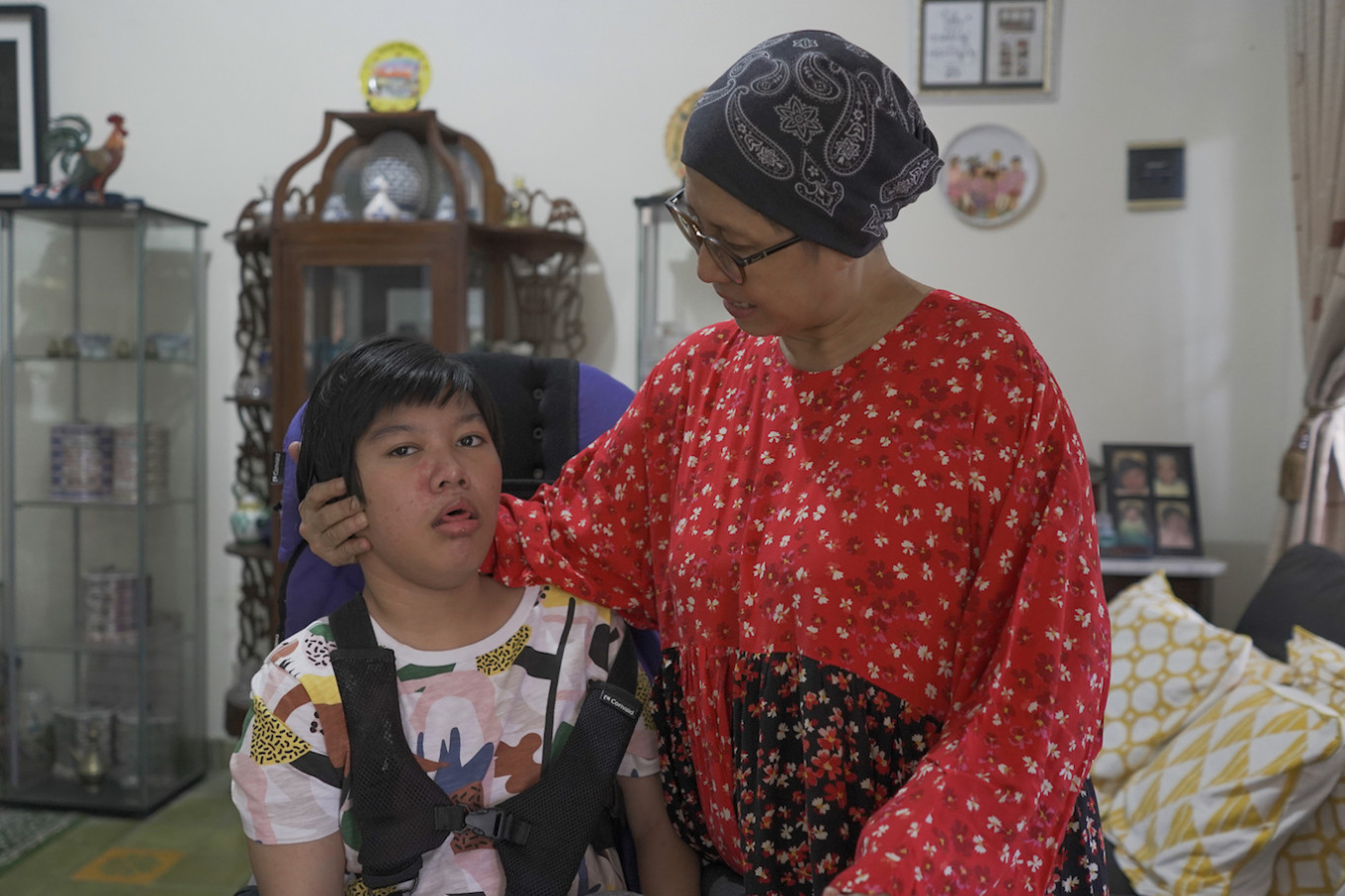Popular Reads
Top Results
Can't find what you're looking for?
View all search resultsPopular Reads
Top Results
Can't find what you're looking for?
View all search resultsIndonesia's special needs children struggle for proper online education
Online learning has been hard for students, parents, and children, but especially so for children with special needs.
Change text size
Gift Premium Articles
to Anyone
The 9-year-old girl, who was born with hydrocephalus and cerebral palsy, loves to run and play around her schoolyard with her friends, and she excels in art and craft.
Over the past eight years, Felisa has had to undergo several motoric therapies that include balance and concentration training. Before that, Felisa was mostly bedridden, as her legs were almost paralyzed, but in the last two years, thanks to consistent physiotherapy, her motor skills have improved significantly.
Felisa, a student at the Sendangadi inclusive elementary school in Sleman, Yogyakarta, can write long sentences. Her speech is clear, and she has a high degree of curiosity in things that interest her.
But the pandemic has taken its toll on her.
“She likes to socialize with her friends,” Felisa’s mother, Heni Setiyani, said. “She would be so eager when it was time to go to school. Now, the pandemic has disrupted everything.”
As the pandemic has forced schools to shut down since April last year, learning from home has become the new reality for students. Heni noticed how Felisa has become lethargic and less enthusiastic. She’d become more dependent on her parents and showed no interest in any subject, Heni explained.
“She just doesn’t like studying at home,” Heni told the Post, “either because her teacher only sends homework through a WhatsApp group or because she’s longing to play with her friends. Her days mostly lack any meaningful activities.”
Heni said that, during the learning-from-home phase, there were no teaching-learning activities over the Zoom application. Instead, teachers would only send her instructions on what subject to learn next.
“Then the teachers would tell us to do some assignments or homework to be sent the next day,” Heni said. “In the end, it was me who did the homework.”
Out-of-the-box studying
Nina Ariyanti, 55, says the pandemic has forced her to think out of the box when it comes to helping her daughter learn. Her daughter, Kalya Gupita Darujati, who was born with cerebral palsy, loves to see colorful and bright images and is keen on playing with her friends.
Now, Nina has to come up with her own interactive teaching activities, because the teachers at Kalya’s school rarely interact with students.
“Just homework and homework,” said Nina. “So, I printed some images and made some posters for her. And then we would go through each image and I have to explain it. She seems to enjoy it.”
Kalya would undergo physiotherapy twice a week before the pandemic in sessions that included speech and balance therapy, but as many therapy facilities have closed during the pandemic, Nina has to hire a personal therapist at home.
“She likes to listen to music and dance,” Nina said. “But now she spends her days in bed.”
Special needs children had been left behind long before the pandemic, according to Dr. Joko Yuwono, an expert on education for special needs kids at Sebelas Maret University in Surakarta. The pandemic has plunged them even deeper into a state of uncertainty.
“Compared to other students, special needs kids are particularly hard hit by the pandemic,” said Joko. “Because they need special attention and different teaching methods, depending on their conditions. Now their access to education and other necessities is limited, and no one is prepared for this.”
According to 2017 data from Statistics Indonesia (BPS), there are 1.6 million special needs children. About 70 percent of them do not receive proper education, either at an inclusive school or a school for the disabled (SLB).
Parental double duty
The government has issued the Learn-From-Home Guidebook for teachers, but how to implement the methods remains unclear. Based on the guide, according to Joko, teachers should conduct home visits for special needs children to monitor, evaluate and coordinate with parents on devising a suitable learning process.
But since special needs education lacked resources and infrastructure, as well as a standardized curriculum, each inclusive and special needs school has its own methods, Joko explained.
“In the end, parents must double as teachers,” Joko said. “I know it’s not an easy task to do in between other chores, but this is the best we can do for the kids. We can’t be entirely dependent on teachers at this time, because the most important thing is to teach the children to be independent.”
Reny Indrawati, founder of Forum for Family of Cerebral Palsy (WKCP), said that, while each special-needs child was different, a standardized teaching method would not work. Instead, she encourages teachers to identify and modify their methods depending on the conditions of each child.
“Teachers must be more creative,” Reny told the Post. “No matter how their condition, each special-needs child has the right to receive information and proper education.”
While Heni fears that her daughter’s condition will regress during the pandemic, Felisa is still a high-spirited and curious 9-year old. When asked what she wanted to become when she grows up, she answered joyfully: “I want to be a doctor.”
She knows what she wants and she’s working on it.











